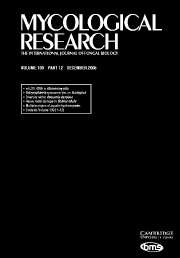Crossref Citations
This article has been cited by the following publications. This list is generated based on data provided by
Crossref.
Gottlieb, Alexandra M.
Wright, Jorge E.
and
Moncalvo, Jean-Marc
2002.
Inonotus s. l. in Argentina — Morphology, cultural characters and molecular analyses.
Mycological Progress,
Vol. 1,
Issue. 3,
p.
299.
LATIFFAH, Z
HARIKRISHNA, K
TAN, S G
TAN, S H
ABDULLAH, F
and
HO, Y W
2002.
Restriction analysis and sequencing of the ITS regions and 5.8S gene of rDNA of Ganoderma isolates from infected oil palm and coconut stumps in Malaysia.
Annals of Applied Biology,
Vol. 141,
Issue. 2,
p.
133.
Szedlay, Gyöngyi
2002.
Is the widely used medicinal fungus the Ganoderma lucidum (Fr.) karst. sensu stricto?.
Acta Microbiologica et Immunologica Hungarica,
Vol. 49,
Issue. 2-3,
p.
235.
Green, Stefan J.
Freeman, Stanley
Hadar, Yitzhak
and
Minz, Dror
2004.
Molecular tools for isolate and community studies of Pyrenomycete fungi.
Mycologia,
Vol. 96,
Issue. 3,
p.
439.
Wang, D -M
and
Yao, Y -J
2005.
Intrastrain internal transcribed spacer heterogeneity inGanodermaspecies.
Canadian Journal of Microbiology,
Vol. 51,
Issue. 2,
p.
113.
Utomo, C.
Werner, S.
Niepold, F.
and
Deising, H.B.
2005.
Identification of Ganoderma, the causal agent of basal stem rot disease in oil palm using a molecular method.
Mycopathologia,
Vol. 159,
Issue. 1,
p.
159.
Zakaria, L.
Ali, N.S.
Salleh, B.
and
Zakaria, M.
2008.
Molecular Analysis of Ganoderma species from Different Hosts in Peninsula Malaysia.
Journal of Biological Sciences,
Vol. 9,
Issue. 1,
p.
12.
Moncalvo, Jean-Marc
and
Buchanan, Peter K.
2008.
Molecular evidence for long distance dispersal across the Southern Hemisphere in the Ganoderma applanatum-australe species complex (Basidiomycota).
Mycological Research,
Vol. 112,
Issue. 4,
p.
425.
Zheng, Linyong
Jia, Dinghong
Fei, Xiaofan
Luo, Xia
and
Yang, Zhirong
2009.
An assessment of the genetic diversity within Ganoderma strains with AFLP and ITS PCR-RFLP.
Microbiological Research,
Vol. 164,
Issue. 3,
p.
312.
Yuen, John
Buswell, John
and
Benzie, Iris
2011.
Herbal Medicine.
Vol. 20115386,
Issue. ,
p.
175.
Robles, Carolina A.
Carmarán, Cecilia C.
and
Lopez, Silvia E.
2011.
Screening of xylophagous fungi associated with Platanus acerifolia in urban landscapes: Biodiversity and potential biodeterioration.
Landscape and Urban Planning,
Vol. 100,
Issue. 1-2,
p.
129.
Bhansali, Rikhab Raj
2012.
Plant Defence: Biological Control.
p.
209.
Zhou, Xuan-Wei
Su, Kai-Qi
and
Zhang, Yong-Ming
2012.
Applied modern biotechnology for cultivation of Ganoderma and development of their products.
Applied Microbiology and Biotechnology,
Vol. 93,
Issue. 3,
p.
941.
Papp, V.
Geösel, A.
and
Erős-Honti, Zs.
2012.
NativeGanodermaspecies from the carpathian basin with the perspective of cultivation review.
Acta Alimentaria,
Vol. 41,
Issue. Supplement 1,
p.
160.
Wang, Xin-Cun
Xi, Rui-Jiao
Li, Yi
Wang, Dong-Mei
Yao, Yi-Jian
and
Lespinet, Olivier
2012.
The Species Identity of the Widely Cultivated Ganoderma, ‘G. lucidum’ (Ling-zhi), in China.
PLoS ONE,
Vol. 7,
Issue. 7,
p.
e40857.
Singh, S. K.
Doshi, Anila
Pancholy, Anjly
and
Pathak, Rakesh
2013.
Biodiversity in wood-decay macro-fungi associated with declining arid zone trees of India as revealed by nuclear rDNA analysis.
European Journal of Plant Pathology,
Vol. 136,
Issue. 2,
p.
373.
Wang, Dong-Mei
Wu, Sheng-Hua
Yao, Yi-Jian
and
Teichert, Ines
2014.
Clarification of the Concept of Ganoderma orbiforme with High Morphological Plasticity.
PLoS ONE,
Vol. 9,
Issue. 5,
p.
e98733.
Selvakumar, Palaniappan
Rajasekar, Seetharaman
Babu, Anam Giridhar
Periasamy, Karupannan
Raaman, Nanjian
and
Reddy, Modem Sudhakara
2015.
Improving biological efficiency of Pleurotus strain through protoplast fusion between P. ostreatus var. florida and P. djamor var. roseus.
Food Science and Biotechnology,
Vol. 24,
Issue. 5,
p.
1741.
Zhou, Li-Wei
Cao, Yun
Wu, Sheng-Hua
Vlasák, Josef
Li, De-Wei
Li, Meng-Jie
and
Dai, Yu-Cheng
2015.
Global diversity of the Ganoderma lucidum complex (Ganodermataceae, Polyporales) inferred from morphology and multilocus phylogeny.
Phytochemistry,
Vol. 114,
Issue. ,
p.
7.
Zhang, Xiuqing
Xu, Zhangyang
Pei, Haisheng
Chen, Zhou
Tan, Xiaoyan
Hu, Jing
Yang, Bin
Sun, Junshe
and
Zhou, Fengfeng
2017.
Intraspecific Variation and Phylogenetic Relationships Are Revealed by ITS1 Secondary Structure Analysis and Single-Nucleotide Polymorphism in Ganoderma lucidum.
PLOS ONE,
Vol. 12,
Issue. 1,
p.
e0169042.

